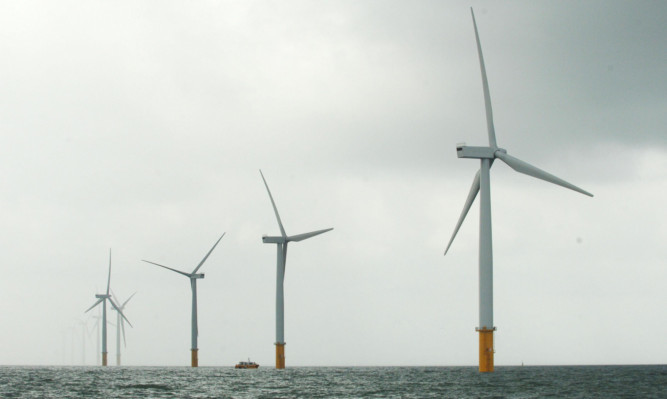
Who will pick up bill for renewable energy subsidies if voters back independence?
The long grass of politics is packed with experts running the rule over ideas which those running the country know will cause them a headache one day.
Ordering an independent commission or review buys politicians time, but the problem with this cottage industry is that it doesn’t always come back with the answers they want to hear.
One potential “inconvenient truth” hovering over the SNP administration is who picks up the bill for renewable energy subsidies if voters back independence.
Currently the subsidies needed to make wind and wave power profitable are shared across 23 million households UK-wide instead of just 2.4 million north of the border.
The chances of this deal worth more than £500 million a year to Scotland continuing in the event of a Yes vote are in doubt according to a member of First Minister Alex Salmond’s own expert commission on energy regulation.
Audrey Gallacher is a member of this commission and Director of Energy for Consumer Futures, the statutory consumer organisation.
Last year her department submitted a paper to a Westminster inquiry into Scottish independence and energy that makes uncomfortable reading for many in the SNP.
The paper makes the point that an independent Scotland would find itself in competition with a number of EU member states with electricity interconnectors to England, including the Republic of Ireland, France and Holland.
If, as is suggested by the SNP, a UK-wide subsidy stays in place even if the UK does not exist anymore, then, according to the paper: “It would appear to be the case that England and Wales consumers would not pay support revenues for zero carbon electricity imports from Ireland, France and the Netherlands but would pay them for imports from Scotland.”
This, the paper argues, may give Scotland “an unfair competitive advantage over generators in other EU member states, with it effectively becoming a preferred trading partner over these nations”.
The paper signs off with a warning that gets to the heart of this issue namely that there is a risk it could become “politically untenable to expect voters to pay to stimulate energy assets in other nations”.
It is a point picked up by Energy Secretary Ed Davey.
He said: “The Scottish Government cannot assume that English, Welsh and Northern Irish consumers would still be willing to subsidise Scottish renewables.
“The rest of the UK will see an independent Scotland as part of a competitive international energy market.
“Scottish renewables have flourished precisely because Scotland is part of the UK, spreading costs over a large market. Though it consumes only 9% of UK’s electricity, Scotland receives more than a third of the UK’s subsidies through the Renewables Obligation.
“Spreading these costs, around £530 million a year, over 2.5 million Scottish households compared to the 23 million in the UK could mean Scots paying more. It will be much harder for an independent Scotland to support renewables and keep electricity prices competitive.”
The counter argument put forward by the SNP is simple. Green energy from Scotland is needed to keep the lights on in England. Scotland is blessed with an abundance of natural resources a point, Salmond insists, that has not gone unnoticed by the world’s big energy generators.
Speaking last year, he said: “In order to get anywhere near the renewable energy obligations that London is going to have, England is going to have to have Scottish renewables from the sea.
“Perhaps the reason why all these international companies are committing funds to Scotland is because in 10 years’ time, without Scottish offshore wind power, then there would be a severe danger of the lights going off in England.
“I don’t think anybody is going to want or allow that to happen.”
But Labour’s Shadow Energy Minister Tom Greatrex described the idea that the rest of the UK would continue to finance renewables in a separate Scotland as “ludicrous”.
He added: “It is yet another hope-for-the-best assertion by the SNP which isn’t supported by any evidence.”

Enjoy the convenience of having The Sunday Post delivered as a digital ePaper straight to your smartphone, tablet or computer.
Subscribe for only £5.49 a month and enjoy all the benefits of the printed paper as a digital replica.
Subscribe